Related Research Articles

An Evening's Love, or The Mock Astrologer is a comedy in prose by John Dryden. It was first performed before Charles II and Queen Catherine by the King's Company at the Theatre Royal on Bridges Street, London, on Friday, 12 June 1668. Samuel Pepys saw the play on 20 June of that year, but didn't like it; in his Diary he called it "very smutty."
The Royalist is a 1682 comedy play by the English writer Thomas D'Urfey. It was staged at the Dorset Garden Theatre by the Duke's Company, shortly before the merger that created the United Company. It is set during the Commonwealth Era following the English Civil War.

The Squire of Alsatia is a 1688 comedy play by the English writer Thomas Shadwell. Alsatia was a nickname for the Whitefriars area of London, deriving from Alsace in northeastern France. A restoration comedy, it was performed at the Drury Lane Theatre by the United Company following on from John Crowne's Darius, King of Persia. One of the best-remembered roles, that of the shrewish Mrs. Termagant was first performed by Elizabeth Boutell. It was revived numerous times during the eighteenth century.
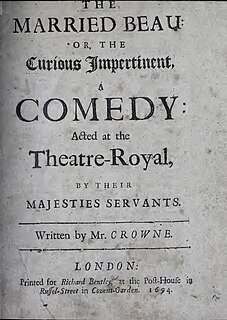
The Married Beau or The Curious Impertinent is a 1694 comedy play by the English writer John Crowne. It is inspired by a passage from Miguel de Cervantes's Don Quixote. Incidental music was composed by Henry Purcell.
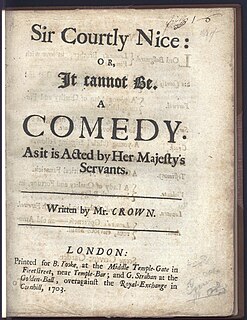
Sir Courtly Nice: Or, It Cannot Be is a 1685 comedy play by the English writer John Crowne. Rehearsals by the United Company were underway when the death of Charles II in February led to the closure of all theatres as a mark of respect. The play was eventually staged on 9 May at the Theatre Royal, Drury Lane. It is the tradition of the Restoration Comedy. A popular hit it became a stock part of the repertoire for more than a century, with Colley Cibber and Anne Oldfield appearing in a celebrated 1709 revival.
The Adventures of Five Hours is a 1663 comedy play by the English writer Sir Samuel Tuke, 1st Baronet. Based on the play Los empenos de seis horas by Antonio Coello, It is an early example of the developing Restoration comedy tradition. Its success led to a series of sentimental plays in the Spanish style about love and honour, very different to the more sophisticated and cynical comedies which the Restoration era became known for.
Squire Oldsapp is a 1678 comedy play by the English writer Thomas D'Urfey. Staged by the Duke's Company at the Dorset Garden Theatre in London, the original cast included Thomas Betterton as Welfore, William Smith as Henry, John Crosby as Lovell, James Nokes as Squire Oldsapp, Anthony Leigh as Sir Frederick Banter, Samuel Sandford as Colonel Buff, Cave Underhill as Pimpo, Emily Price as Christina and Elizabeth Currer as Madame Tricklove.
The Country Wit is a 1676 comedy play by the English writer John Crowne, part of the tradition of Restoration Comedy. It was first staged at the Dorset Garden Theatre in London by the Duke's Company. The cast included Samuel Sandford as Sir Thomas Rash, Thomas Betterton as Ramble, James Nokes as Sir Mannerly Shallow, Henry Harris as Merry, Cave Underhill as Booby, Matthew Medbourne as Lord Drybone, Anthony Leigh as Rash, Mary Betterton as Lady Faddle, Mary Lee as Christina, Elizabeth Currer as Betty Frisque and Elinor Leigh as Isabella.

Dame Dobson is a 1683 comedy play by the English writer Edward Ravenscroft.
A Commonwealth of Women is a 1685 comedy play by the English writer Thomas D'Urfey. Originally performed by the United Company as the Theatre Royal, Drury Lane the cast included Joseph Williams as Captain Marine, Philip Griffin as Du Pier, Thomas Percival as Boldsprite, Thomas Jevon as Franvil, Anthony Leigh as Frugal, Joseph Haines as Hazard, Thomas Gillow as Don Sebastian, John Bowman as Nicusa, Henry Norris as La Mure, Joseph Harris as Bourcher, Katherine Corey as Roselia, Mary Lee as Clarinda, Margaret Osborne as Ariadne, Sarah Cooke as Aminta, Emily Price as Hippolita, and Frances Maria Knight as Aglaura.

A Fond Husband; Or, The Plotting Sisters also known as The Fond Husband is a 1677 comedy play by the English writer Thomas D'Urfey. It was first staged by the Duke's Company at London's Dorset Garden Theatre with a cast that included William Smith as Rashley, Henry Harris as Ranger, James Nokes as Peregrine Bubble, Anthony Leigh as Old Fumble, Samuel Sandford as Sir Roger Petulant, Thomas Jevon as Sneak, John Richards as Spatterdash, Thomas Percival as Apothecary, Elizabeth Barry as Emillia, Rebecca Marshall as Maria and Margaret Hughes as Cordelia. The published version was dedicated to the Irish statesman James Butler, Duke of Ormonde.
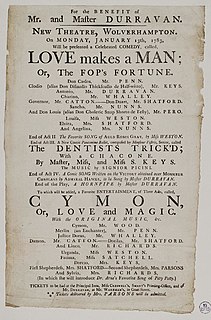
Love Makes A Man; Or, The Fop's Fortune' is a 1700 comedy play by the English writer Colley Cibber. It borrow elements from two Jacobean plays The Elder Brother and The Custom of the Country by John Fletcher.
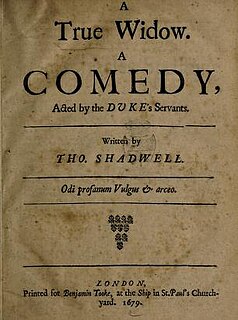
A True Widow is a 1678 comedy play by the English writer Thomas Shadwell. It was first staged by the Duke's Company at the Dorset Garden Theatre in London. The names of the original cast are unknown. The prologue was written by Shadwell's colleague John Dryden. It was published the following year and dedicated to Charles Sedley.
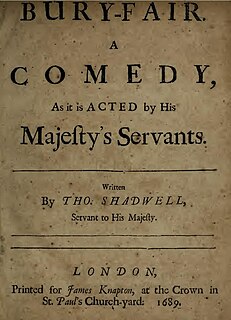
Bury Fair is a 1689 comedy play by the English writer Thomas Shadwell. It is part of the tradition of Restoration Comedy that flourished during the era. It was first staged by the United Company at the Theatre Royal, Drury Lane in London.

Sir Barnaby Whigg; Or, No Wit Like A Womans is a 1681 comedy play by the English writer Thomas D'Urfey. It was first staged by the King's Company at the Theatre Royal, Drury Lane. A song for the play was composed by Henry Purcell.
The Spanish Rogue is a 1673 comedy play by the English writer Thomas Duffet. It was first performed at the Theatre Royal, Drury Lane by the King's Company.
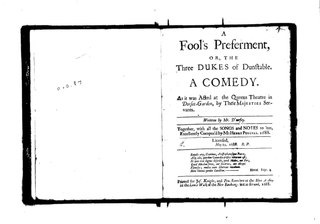
A Fool's Preferment; Or, The Three Dukes Of Dunstable is a 1688 comedy play by the English writer Thomas D'Urfey. It is a reworking of John Fletcher's Jacobean work The Noble Gentleman. It was first performed by the United Company at the Dorset Garden Theatre in London. Henry Purcell composed the play's incidental music. It was his first major work composingfor the theatre in seven years since Sir Barnaby Whigg.

Tom Essence; Or, The Modish Wife is a 1676 comedy play by Thomas Rawlins, sometimes also attributed to Edward Ravenscroft. It was first performed at the Dorset Garden Theatre in London by the Duke's Company. Along with Thomas Otway's The Soldier's Fortune it incorporated scenes from Moliere's The Imaginary Cuckold in an otherwise unrelated plot.

Sir Salomon; Or, The Cautious Coxcomb is a 1670 comedy play by the English writer John Caryll. It has often been staged under the title Sir Solomon Single. It was first performed by the Duke's Company at the Lincoln's Inn Fields Theatre in London. It is part of the tradition of Restoration comedy.
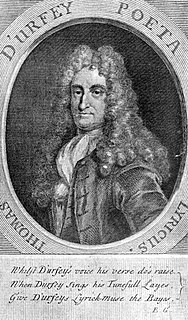
The Campaigners; Or, The Pleasant Adventures At Brussels is a 1698 comedy play by the English writer Thomas D'Urfey. It was first staged at the Theatre Royal, Drury Lane by Christopher Rich's Company.